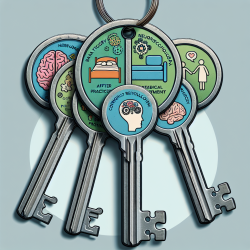Introduction
As practitioners in the field of speech-language pathology, understanding the underlying genetic factors that contribute to developmental delay (DD) and intellectual disability (ID) can significantly enhance our ability to tailor interventions and improve outcomes for children. A recent review titled "A Review of the Genomic Analysis of Children Presenting with Developmental Delay/Intellectual Disability and Associated Dysmorphic Features" provides critical insights into the genomic techniques used to diagnose these conditions, such as chromosomal microarray (CMA) and whole exome sequencing (WES).
Key Findings from the Research
The research emphasizes the superiority of CMA over traditional techniques like G-banded karyotyping and FISH analysis in diagnosing neurodevelopmental disorders. CMA has a diagnostic yield of approximately 20-25%, making it a powerful tool for identifying chromosomal abnormalities that contribute to DD/ID.
WES is recommended as a secondary examination when CMA results are inconclusive. It provides a high-resolution analysis of the protein-coding regions of the genome, allowing for the identification of variants that may not be detected through other methods.
Implications for Practitioners
For practitioners, the implementation of these genomic analyses can lead to more precise diagnoses and tailored interventions. Understanding the genetic basis of a child's condition can guide the development of individualized therapy plans that address specific needs, whether they relate to communication, cognitive development, or social skills.
- Enhanced Diagnosis: Utilize CMA as a first-tier test for children presenting with DD/ID to identify potential genetic causes.
- Targeted Interventions: Develop therapy plans that consider the genetic findings, focusing on areas such as speech, motor skills, and social interaction.
- Family Counseling: Provide families with genetic information that can help them understand their child's condition and potential future needs.
Encouraging Further Research
While current genomic techniques offer significant insights, there is a continuous need for research to refine these methods and explore new ones. Practitioners are encouraged to stay informed about advancements in genomic analysis and consider participating in research studies that aim to improve diagnostic accuracy and therapeutic outcomes.
Conclusion
Incorporating genomic analysis into clinical practice can transform the way we approach developmental disorders. By leveraging the latest research findings, practitioners can make data-driven decisions that enhance the quality of care provided to children with DD/ID.
To read the original research paper, please follow this link: A Review of the Genomic Analysis of Children Presenting with Developmental Delay/Intellectual Disability and Associated Dysmorphic Features.










